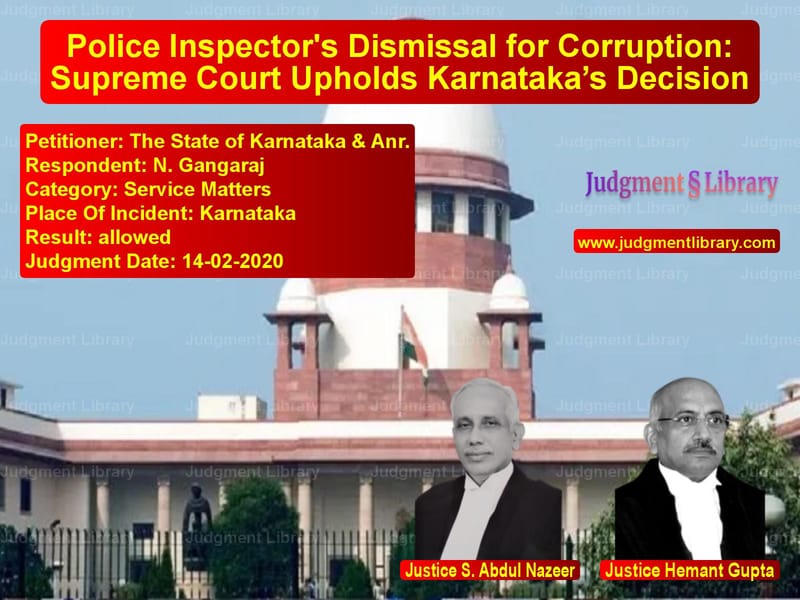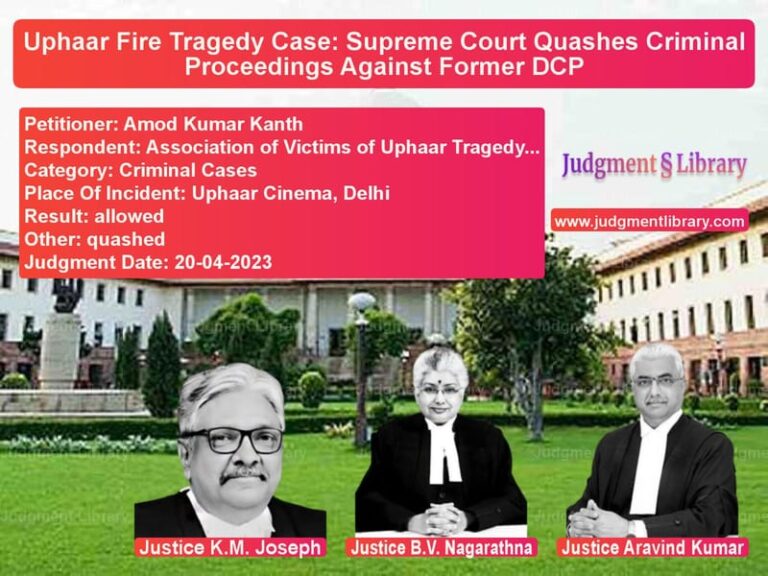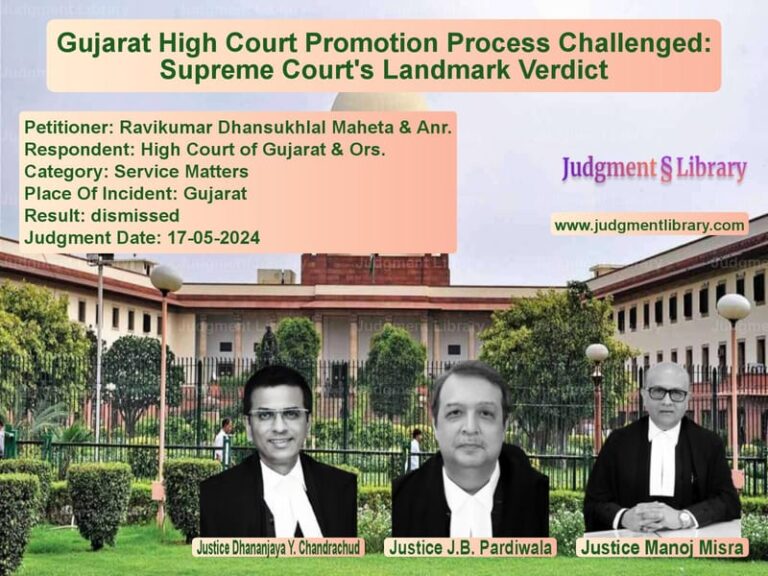Police Inspector’s Dismissal for Corruption: Supreme Court Upholds Karnataka’s Decision
The case of The State of Karnataka & Anr. v. N. Gangaraj revolves around the dismissal of a police inspector found guilty of corruption and misconduct. The Supreme Court had to determine whether the High Court and the Karnataka Administrative Tribunal (KAT) erred in overturning the disciplinary authority’s decision. This case clarifies the principles of judicial review in disciplinary matters and reinforces the limited scope of interference by courts in such decisions.
Background of the Case
The respondent, N. Gangaraj, served as a Police Inspector in Mysore from July 31, 1997, to October 31, 1998. A complaint was filed against him by a woman named Nirmala, leading to a trap by the Lokayukta police. Following this, a case under the Prevention of Corruption Act, 1988, was registered against him, and a charge sheet was filed before the Special Judge, Mysore. The respondent was acquitted in the criminal case, but he was also subjected to departmental disciplinary proceedings for misconduct.
Legal Issues Involved
- Whether the disciplinary proceedings could be sustained despite acquittal in a criminal case.
- Whether the Karnataka Administrative Tribunal and the High Court had the authority to interfere with the disciplinary authority’s decision.
- Whether the disciplinary authority’s findings were supported by evidence.
Charges Against the Respondent
The departmental proceedings against Gangaraj were based on the following charges:
- He illegally obtained a copy of a complaint filed by a woman named Chandrika against Mahendra and his associates for alleged rape and used this to demand a bribe from the driver’s wife, Nirmala.
- He demanded Rs.40,000 from Nirmala to exclude her husband’s vehicle from the case, later settling for Rs.20,000.
Petitioners’ Arguments
The State of Karnataka defended its decision, stating:
- The disciplinary authority acted lawfully and followed due process in concluding that Gangaraj was guilty.
- The High Court and KAT exceeded their jurisdiction by reassessing the evidence, which is beyond the scope of judicial review.
- Even though the criminal court acquitted Gangaraj, disciplinary proceedings have a lower standard of proof and independent findings.
- The respondent’s conduct was unbecoming of a police officer and warranted dismissal.
Respondent’s Arguments
N. Gangaraj, the dismissed police officer, argued:
- The criminal court had acquitted him, and the same evidence could not be used to justify disciplinary action.
- The findings in the departmental proceedings were unreliable as the witnesses gave inconsistent statements.
- Since there was no proof that he accepted the bribe, the charge of misconduct was baseless.
Supreme Court’s Analysis
The Supreme Court examined the power of judicial review in disciplinary cases and the distinction between criminal trials and departmental proceedings. The Court emphasized the following points:
- Acquittal in a criminal case does not automatically nullify disciplinary proceedings. The standard of proof in a criminal trial is ‘beyond reasonable doubt,’ whereas in departmental inquiries, a preponderance of probability is sufficient.
- The role of a High Court in judicial review is limited to assessing whether the disciplinary authority followed due process. The court cannot reassess evidence as if it were an appellate authority.
- The Karnataka Administrative Tribunal and the High Court erred by interfering in the disciplinary authority’s factual findings, which were supported by evidence.
- Disciplinary authorities have the sole discretion to determine the appropriate punishment based on the misconduct established through inquiry.
Final Judgment
The Supreme Court ruled in favor of the State of Karnataka, holding that:
- The High Court and KAT overstepped their jurisdiction by reevaluating evidence.
- The disciplinary authority’s decision was based on reasonable evidence, and judicial interference was unwarranted.
- The dismissal order against Gangaraj was restored, upholding the government’s decision to remove him from service.
Impact of the Judgment
This ruling has significant implications for public servants and disciplinary proceedings:
- It reaffirms that disciplinary proceedings can proceed independently of criminal trials.
- It limits the scope of judicial review in such cases, ensuring that courts do not act as appellate authorities.
- It reinforces that disciplinary action can be based on circumstantial and testimonial evidence, even if there is no direct proof of wrongdoing.
This judgment upholds the importance of integrity in law enforcement and ensures that officers guilty of misconduct face appropriate consequences.
Petitioner Name: The State of Karnataka & Anr..Respondent Name: N. Gangaraj.Judgment By: Justice S. Abdul Nazeer, Justice Hemant Gupta.Place Of Incident: Karnataka.Judgment Date: 14-02-2020.
Don’t miss out on the full details! Download the complete judgment in PDF format below and gain valuable insights instantly!
Download Judgment: The State of Karnata vs N. Gangaraj Supreme Court of India Judgment Dated 14-02-2020.pdf
Direct Downlaod Judgment: Direct downlaod this Judgment
See all petitions in Disciplinary Proceedings
See all petitions in Termination Cases
See all petitions in Judgment by S. Abdul Nazeer
See all petitions in Judgment by Hemant Gupta
See all petitions in allowed
See all petitions in supreme court of India judgments February 2020
See all petitions in 2020 judgments
See all posts in Service Matters Category
See all allowed petitions in Service Matters Category
See all Dismissed petitions in Service Matters Category
See all partially allowed petitions in Service Matters Category







